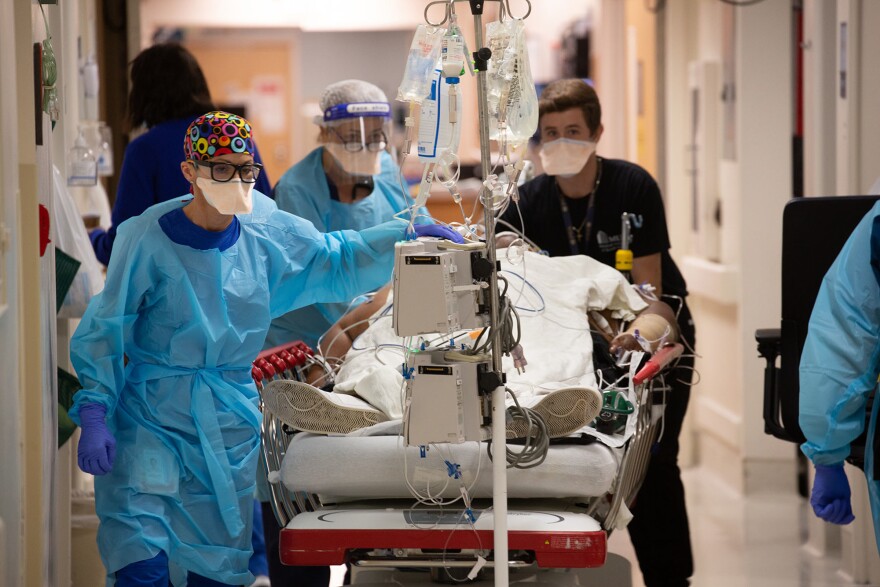During the pandemic, many people suffered from COVID-19 and other illnesses, but new research shows that the kind of neighborhood where they lived had a great impact on whether they died from their afflictions.
A growing body of research shows that where you live can make you more resilient to disaster or disease or much more vulnerable. This affects your health and even how long you live, according to two new research studies.
The research looked at a variety of factors to try to understand why some communities were more vulnerable to poor health outcomes, especially during the pandemic, said Dr. Sadeer Al-Kindi, of Case Western Reserve University and University Hospitals Cleveland.
Both studies examined what researchers call social deprivation and vulnerability and how they are connected to health conditions such as premature death by heart disease, stroke and COVID-19.
The results indicated that when a community suffers from deprivation, which includes poor access to medical care, lack of a nearby grocery store, exposure to air, noise and light pollution and racism, it can be deadly, said Al-Kindi, who is one of the studies’ authors.
Al-Kindi and the team of researchers used a social vulnerability scale to see if living in a vulnerable area also seems to make residents more susceptible to death by COVID-19 or other maladies during the pandemic.
This study compared mortality data from 2019, before the COVID-19 pandemic struck, with figures from 2020 and 2021 and again found that “socioeconomically disadvantaged patients and other poorly defined factors conspire to predispose patients to excess risk of dying from COVID-19 infections.”
That vulnerability also may ratchet up in the indirect effects of COVID-19, the researchers wrote, like access to health care, financial toxicity, and psychosocial support.
The study included a message for policymakers and public health officials: If you want to realize equitable health, policy efforts, resources and investment may all be needed to mitigate the disproportionate societal vulnerability.
Other medical conditions that make COVID-19 worse — like obesity and diabetes — are a consequence of difficult circumstances that are connected to social vulnerability, the study’s authors wrote.
The studies went beyond looking at how income levels or low educational attainment can impact a person's life. The results indicated that the experience of living in a nexus of deprivation and stress makes people more vulnerable to things like COVID-19 and an early death by heart disease, Al-Kindi said.
In the study published in Mayo Proceedings last month, Al-Kindi and a team of other researchers looked at how social deprivation was connected to dying young (before age 65) of heart disease.
Researchers have known for decades that there is an association between social deprivation and premature cardiovascular disease, he said.
“It's a linear relationship,” Al-Kindi said, “meaning as you increase the social deprivation… you have higher rates of premature cardiovascular disease.”
Premature death caused by heart disease decreased between 1999 and 2018, the study noted. So the research team expected people living in areas of social deprivation and those of higher socioeconomic position would both have made strides to prevent early death by heart disease – with greater gains coming in the more vulnerable areas, he said.
“What we found was actually the exact opposite,” Al-Kindi said.
Between 1999 and 2018, premature cardiovascular death became less prevalent in communities where people have more resources, the study showed. But the per capita rate of early death by heart disease among people who live in more vulnerable communities was significantly greater.
“This has significant implications, obviously, because… there are disparities in the 90s, and we were hoping to see that… this gap is closing,” said Al-Kindi. “But what we saw is actually that the gap has been widening over time when it comes to social deprivation and premature cardiovascular mortality.”
The question facing researchers now is why, since traditional risk factors like diabetes, smoking and high blood pressure have decreased, he said.
Al-Kindi said his group of researchers will look into what he calls “non-traditional” risk factors, like depression, anxiety, stress, and exposure to pollution that are strongly linked to cardiovascular disease, and how they are affecting communities.
“Also, one of the things that we really have been focusing on is racism,” he said. “And how does racism impact cardiovascular mortality.”
For those living in areas of higher socioeconomic deprivation, the news that where they live could shorten their lives is stress-inducing in itself. You can watch what you eat and not smoke, but individuals can’t do much about air pollution or racism.
But individuals may have more power over these stressors than they think. Air-filters and masks can combat air pollution, Al-Kindi said, as can changing what you use to cook in your own home.
In terms of racism and other outside stressors, perhaps individuals can change their internal response to that stressor, he said.
“You may not be able to deal with the outside stressors to your life,” he said. “But there are ways to deal with how you deal with it, right? How you modify your relationship with that stressor.”
How to best intervene in those situations to improve health outcomes will be a topic of future research, he said.
“The first step is to recognize that there's a problem,” Al-Kindi added. “The second step is really to try to fix that problem.”
The studies were published in the journal Mayo Clinic Proceedings and the American Journal of Cardiology.
Copyright 2022 WKSU. To see more, visit WKSU.


